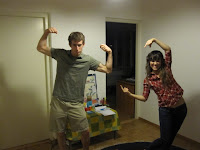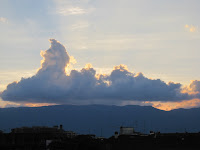This week we had our first dinner guest. Aaron happens to live across the street, but we met him at the UN where he is doing a fellowship for the summer. He's a Harvard Law student, 25, and single (for anyone interested). Okay, he might kill me for saying that, but oh well.
We met Aaron on Tuesday as we were about to leave the the UN for the day and soon found out that he lived near us. I think he followed us home because when we got off the tram he came running up behind us. Okay, maybe not. He was carrying a bag of groceries, after all. Anyway, we figured out that he was actually in the building next to us, and since our apartment is much larger than his, we took him home for dinner. Oh, I mean we invited him over for dinner.
We are all on tight budgets since food is SOOOOO EXPENSIVE, so we combined what we had and came up with the following:
- Grilled chicken (Jess is Vegan so she wouldn't eat it - and it cost nearly $14 for two chicken breasts, so I may not have any more while I'm here either!)
- Spicy risotto rice cooked to disaster (sorry Aaron)
- Baked asparagus with mushrooms, onions, and carrots (this was the best part of the meal - thanks Jess)
- Bread with olive oil and balsamic vinegar (we can't possibly have a meal without bread here)
It was a clear and beautiful night, so we sat on the back patio and shared this view as we chatted:
Not too shabby, huh? We have had some beautiful sunsets here and our apartment is positioned perfectly to watch them every night if we want to.
I bet you are wondering how Leap Frog comes into this dinner party. Well, since Aaron was our first guest here in Geneva, I told him that I would need a picture of him for the blog (I know, I'm such a nerd!). He wasn't happy with just any pictures, so he some how convinced Jess to play leap frog with him, so...
 |
| Great form, right? |

I'm not sure why it went from leap frog to muscle poses, but it did, so here are a few of those:

The dinner was mostly good, the conversation was great, and the evening was hilarious!






































